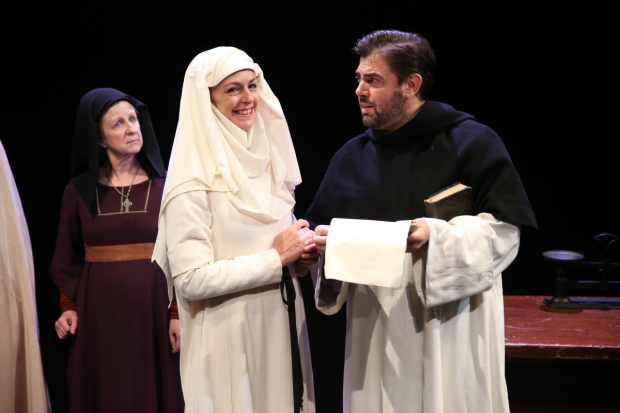A Woman Reaches for Magnificence in The Saintliness of Margery Kempe
Austin Pendleton directs the off-Broadway revival of John Wulp’s 60-year-old comedy about morality in medieval times .

(© Carol Rosegg)
"Morality! Damn all morality!" It's an attention-grabbing opening line, especially coming from a 14th-century English housewife whose designated societal function is to pass on Christian morals to her children. Margery Kempe — a Christian mystic credited with writing one of the first English-language autobiographies — has all the makings of a compelling protagonist. She in no uncertain terms took control of her narrative in real life, and in John Wulp's rendering, she subversively fights the forces of God, nature, and patriarchy to set herself apart from the pious multitude. Gender, identity, duty, religion: We anticipate discussions of them all after Margery's rebuke of Christian virtue. And yet, John Wulp crafted The Saintliness of Margery Kempe (now running at the Duke on 42nd Street) as more of an antihero's Odyssey — a comic picaresque that's neither campy enough to keep us laughing nor penetrating enough to keep us thinking. The result is something much duller than it has any right to be.
Margery (Andrus Nichols) wants to be extraordinary in whatever form that takes. When we meet her, she lives in an unremarkable house with an unremarkable husband (Jason O'Connell, making the most of his comic skills) and six unremarkable children, each named after a Christian virtue (Felicity, Hope, Patience, Forbearance, Endurance, and baby Resignation). Guiltlessly leaving them all behind, Margery first tries being extraordinarily sinful, buying a brewery that ultimately fails. She then tries being extraordinarily devout, posing as a saint (perhaps momentarily believing her own divinity) and journeying across the sea to the Holy Land where her mock "piety" makes her insufferable to her fellow travelers (O'Connell reappears as her frustrated Holy Land tour guide, Friar Bonadventure). In between, she succumbs to lust (Vance Quincy Barton playing the seductive Man in Black), cons a vicar into believing her saintliness (Timothy Doyle as the easily flattered Robert of Caistor), and wills a dubious "miracle" by surviving a blow from a rogue stone.
The earnestness of each vignette fluctuates — her seduction and subsequent rejection by Man in Black reading as a sincerely crushing event, as opposed to her faux miracle, which she shakes off like Wile E. Coyote taking an anvil to the head. But with no rhyme or reason to Margery's victories, defeats, and internalized lessons, these ebbs and flows feel as arbitrary as her whims.
Director Austin Pendleton has set out to dust off this 60-year-old play — Wulp's first, which was produced at the Poets' Theatre in Cambridge, Massachusetts, in 1957 (Pendleton dug up the script from this Cambridge production, rather than using a later revised version ). Dust, however, isn't so much the problem as is 60-year-old clutter that this production dances around in lieu of doing a thorough purge. Pendleton and Wulp (who also serves as the production's set designer) have made theatricality the goal, with actors playing multiple roles (special kudos to Thomas Sommo who plays the horse, Pegasus), an onstage costume chest providing materials for quick changes (Barbara A. Bell outfitting the cast in slapdash medieval garments), and set pieces like ladders imagined as ships. There are plenty of ideas channeled toward the cause of creativity, but none of them coalesce into an organic vocabulary.
Our title character feels similarly stranded in a narrative that renders her less than the sum of her parts. In his program notes, Wulp describes Margery as "a woman who did not want her life to be defined either by men or by the strictures of her society," and Nichols's performance meets this description with a single-minded and relatable rebellion that teeters between determination and mania. She even manages to build her own stakes through her various soul-searching exploits, but they deflate as soon as we realize that her quixotic quest for freedom adds up to disappointingly little.
"Love," I suppose, is the moral that surfaces at the end of Wulp's (im)morality play. It's the word that keeps buzzing in Margery's ear on each leg of her journey, and (spoiler alert) it's the word that finally brings her back to the comforts of hearth and home — a curious choice for a woman determined to not be defined by a male-dominated society. She does, however, return to domestic life with plans to take down her stories in a book. Is she the poster child of "having-it-all" in the Middle Ages, or is she headed for more dissatisfaction and despair? For her sake I hope the former, but I can't help but think she's right back where she started .







